People in Anuradhapura haven’t seen rain for a while. This was evident during our visit to Rajarata. Parched paddy fields, dusty roads and a community thriving from scarce resources conveyed many messages to us. Apart from that, a section of the community also suffers from kidney disease while some among them are at a chronic stage. But many of these people saw a ray of hope when they became a part of several health promotion approaches. These were implemented by the Health Promotion Department at the University of Rajarata. As a result, a community that once saw life as a burden has gradually transformed into a community of problem-solvers and positive thinkers.
Some interesting concepts
Through Health Promotion, the Department has been able to introduce some interesting concepts to the communities they work with. These include the mobile library which is handled by the children’s society. Here, books include everything from children’s books to bana books and everybody from children to elders can make use of these resources. All children who were idling around have been made members in this society and they are sent for leadership training programmes and other activities. Happiness calendars and task charts have changed the lives of these families by marking which family member is happy or sad and the reason for their emotions. Every day, the task chart allocates household work for all family members. The ladies also draw charts to compare their daily consumption of salt, oil, sugar and milk powder. Through programmes such as ‘Mawu Hawula’ they have been able to sponsor clothes and essential items for elderly women who observe sil. The programme has also encouraged children to stay away from mobile phones and make use of their time to do something productive. With the introduction of baby rooms, that is one of the main goals for any pregnant mother today. So other mothers would gift them materials to build an informative and colourful baby room. Dr. Duminda Guruge, Head of the Health Promotion Department is acknowledged as a ‘god in disguise.’ This was the feedback we received at almost every house we visited. In addition to coursework, he was able to take these concepts out into the community and show them how they can deal with their issues. Today, many families have benefitted from this programme and they are taking the lead to inspire more families.
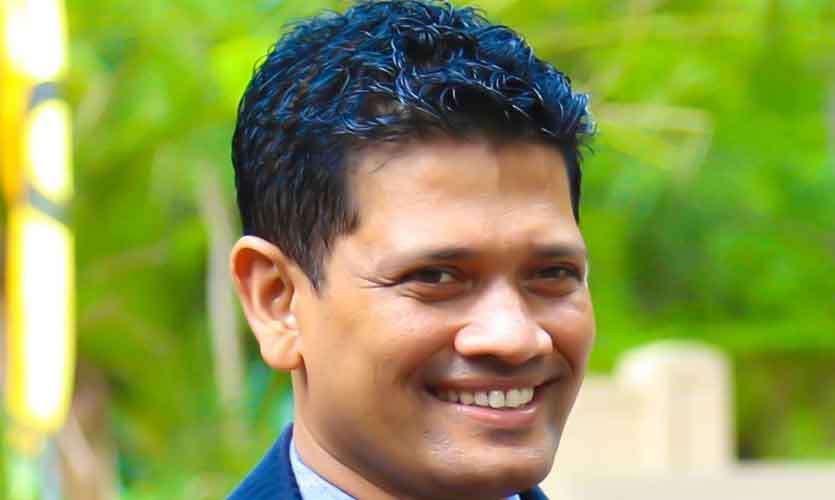
Dr. Duminda Guruge
Samanthika’s story
As you enter Samanthika Jeewani’s house, you are greeted with inspirational messages and colourful drawings. But some time ago, her life was one of sorrow. Having an abusive husband wasn’t healthy for her family members. He was the drunk and abusive type and would ultimately let out his anger on the spouse. But after 2010, things started to change. “My younger son never gained weight,” she recalled while speaking to the Daily Mirror Life. “However much I fed him, his weight remained the same. Thereafter we checked why it had happened that way and we realised that he was affected by the environment he lived in. The arguments I used to have with my husband had psychologically affected my child. But today, he has gained weight and is a bright child. All this was possible after I joined the Health Promotion programme. I met Dr. Duminda at a time when I had thought of giving up on life. But now we are leading a happy life. My husband who once broke all flower pots makes an extra effort to water the plants and maintain a beautiful garden.”

Today she leads several programmes and is an inspiration to all mothers in the area. She travels long distances to conduct workshops and advocate for change within the community. Through Health Promotion they have been introduced to new concepts of recording their daily consumption of essential items such as salt, sugar, milk powder and oil. These are jotted on charts and are compared every month. Through health promotion, they were able to lose weight, keep away from junk food and start leading healthy lives. Even today you could see cracked cabinet glasses and signs of her husband’s violent behaviour. But things have changed for the better.
Quite happy about this programme: Abeyrathne
H. Abeyrathne, Samanthika’s husband couldn’t relate his story without breaking into tears. “I’m quite happy about this programme,” he said with a bright smile. “There were those who changed after they saw the change in me. There was nobody to help us until we met Dr. Duminda. He visited us continuously and made every effort to bring about this change. We didn’t even have this house but my wife has saved money to build it up. With the savings we were able to purchase a tractor as well.”
Saving money has helped us to change our lives for the better : Gangani
For Gangani Kumari, her main goal was to save money. “I participated in many workshops and was keen to find out how to save money,” she said. “I used to spend money in a very careless manner. But after I came for this programme I started writing down all expenditures and then went on collecting Rs. 20 notes. We had financial issues and didn’t know how to find a solution. Through my savings, we were able to start working on our house, buy a bike and we also started sending my daughter for tuition classes. We have also opened savings accounts for all my family members. Now I look at things in a way where I could save even the smallest thing I use. By learning to save money I managed to look at life differently. We don’t have as many problems as we had initially. People had doubts about our change but it was genuine.”
We were able to inculcate moral values in our children: Shyama
“My husband used to consume alcohol and there was no end to it,” recalled Shyama Kumudini. “I participated in this programme in 2010 and started implementing these approaches at home. Thereafter I used to write down his expenses, especially on alcohol and showed it to him. When I was pregnant with my third child I built a baby room and I see a huge improvement in him today. He is more outgoing and is brighter than others in his age. Everything that happens is recorded in a book. We have been able to inculcate moral values in our children. Mothers used to play volleyball to reduce weight and every three months we would check our weight. I’m quite happy that I joined this programme because today I see a drastic change in our lives.”
There’s never a day we are sad: Sandamali
“Dear Aunty and Uncle, don’t bring us junk food. We want to live a healthy life,” reads a welcome message at Sandamali’s house. Sandamali had spent quite a carefree, unhealthy life before she was part of this programme. “I used to be very fat,” she laughed while speaking to us. “Since my husband earns a daily wage we used to get bread worth Rs. 6000 from the bakery every month. In addition to that we would eat junk food and there was no control. I also used to work at a shop and earned Rs. 300. From that I would buy a stack of beedi for my husband and some other items for my children. Initially my husband couldn’t live without beedi. There were days when he would throw me out of the house when he didn’t get his share. Since I had money, I used salt, sugar and even milk powder at my own will. Initially we required close to 4 ½ kilos of sugar per month. But now we can survive with 1 ½ kilos. On the other hand I used to add a lot of salt and oil to food.”
At Sandamali Liyanage’s house one could see happiness calendars, task charts and other tools suspended from the walls. They have also done a baby room for their younger daughter which also has a tiny stage where she is encouraged to perform. The room also includes a heartwarming message written to her daughter by Sandamali herself. On the other hand they also have two bags named stupid food and wise food which was an effective approach to cut down on junk food. Today their children would refuse toffees and chocolates and would opt for healthy options instead. This is how their lives have changed.
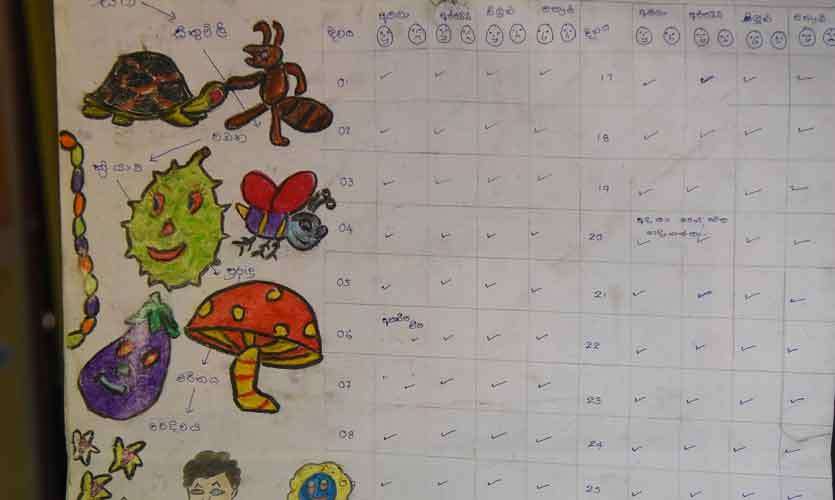
“After this programme I used to write down all our expenses and started saving money,” she continued. “My husband cut down his beedi consumption and with that money I was able to send my daughter for tuition classes as she had to face the scholarship exam. My daughters and husband now help me with household chores and there’s never a day that we are sad. In fact with the happiness calendar we were able to identify the root causes of all our worries. Today I have changed the way I look at life and I will continue these practices and improve them eventually.”
Behavioural change is possible: Dr. Hewageegana
In her comments to the Daily Mirror Life, Dr. Neelamani Rajapaksa Hewageegana, Deputy Director General – Health Services and Planning at the Ministry of Health and Indigenous Medicine said that in order to understand these theories you need to have a scientific background. “Students come from all parts of the country. They are enthusiastic about helping people and I have seen that they are being empowered as well. It’s a practical degree where they work with people and that’s quite a challenging thing. They have a lot of specimen. It took us around three years to convince my own team that empowering of people is possible. But when it went to the people, they grasped it in a few months’ time. When opportunities come to them, they grab it. But I have to say that there are certain media that are misleading people. People sit in front of TV doing nothing and if that’s the culture we are promoting, it will bring about an unhealthy community. One area they touch is how to face adverse effects of media. People have goals and there have to be programmes that would motivate people to reach towards their goals. Behavioural change is possible and unless you know that a behaviour needs to be changed, another person telling that to you may not work.”
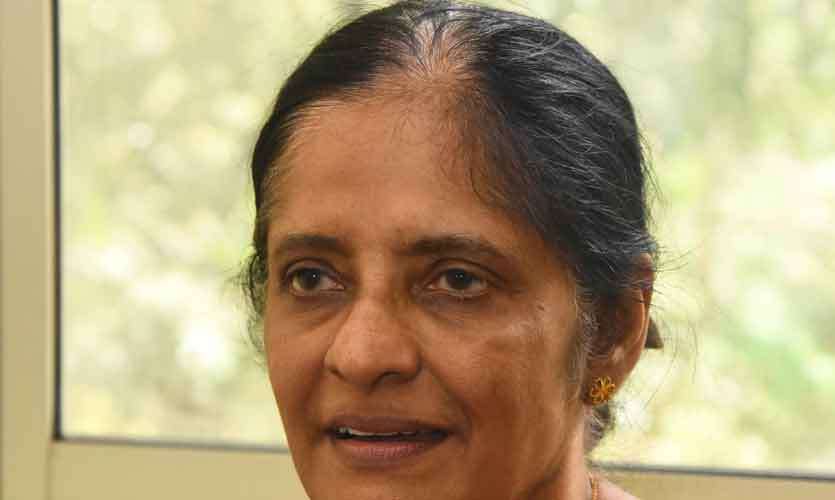
Pics by: Kithsiri De Mel



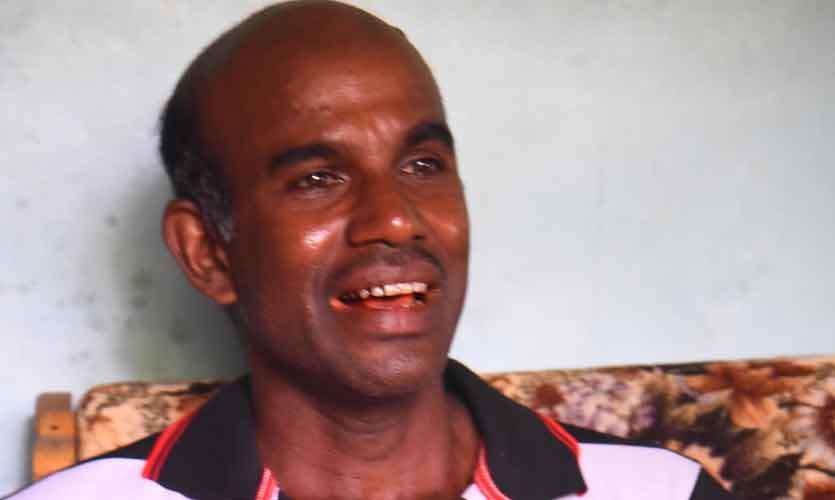

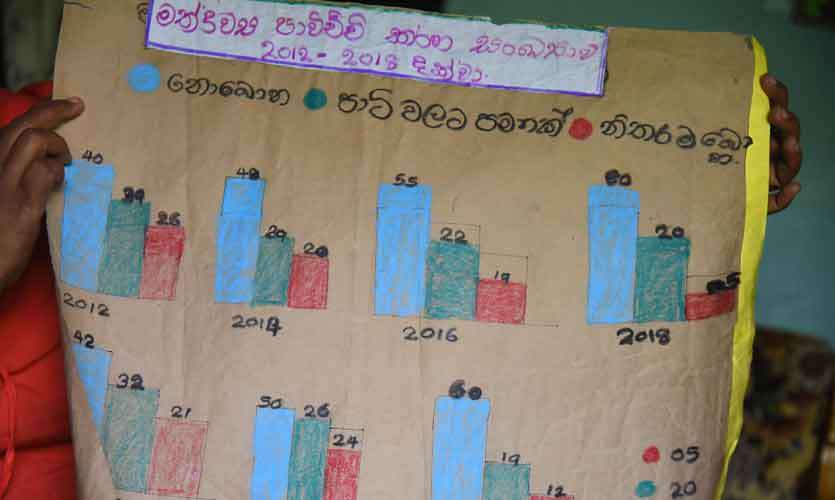


0 Comments